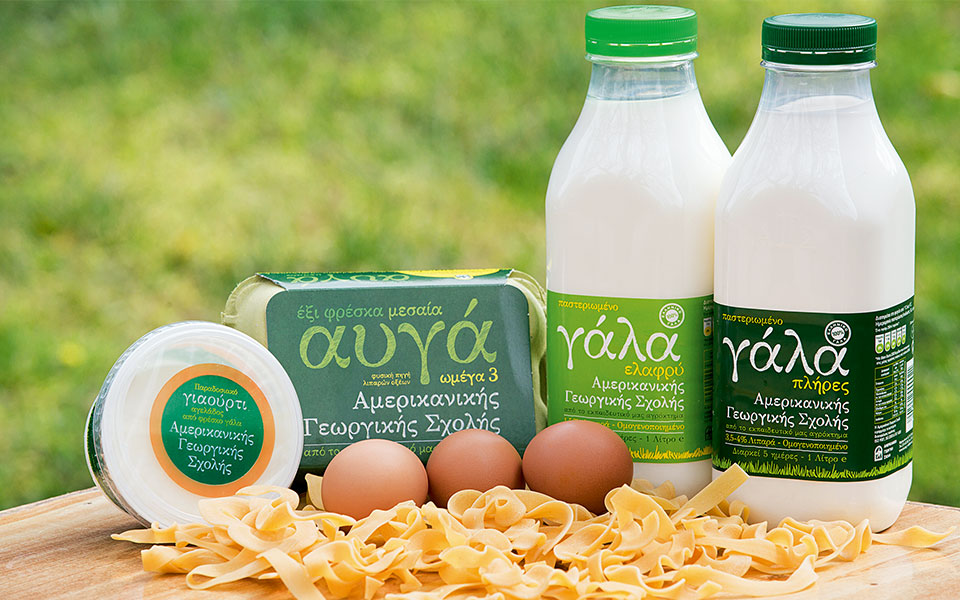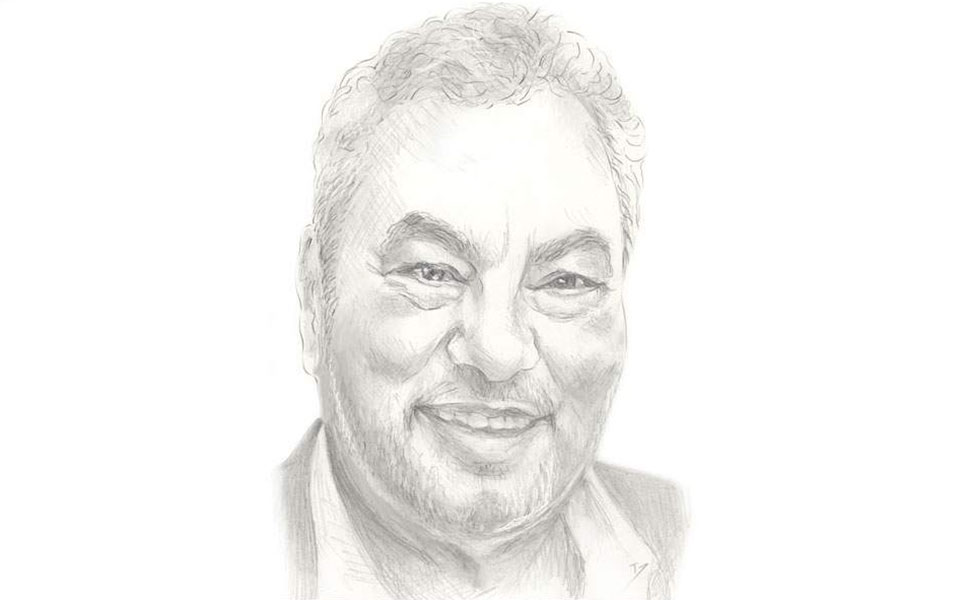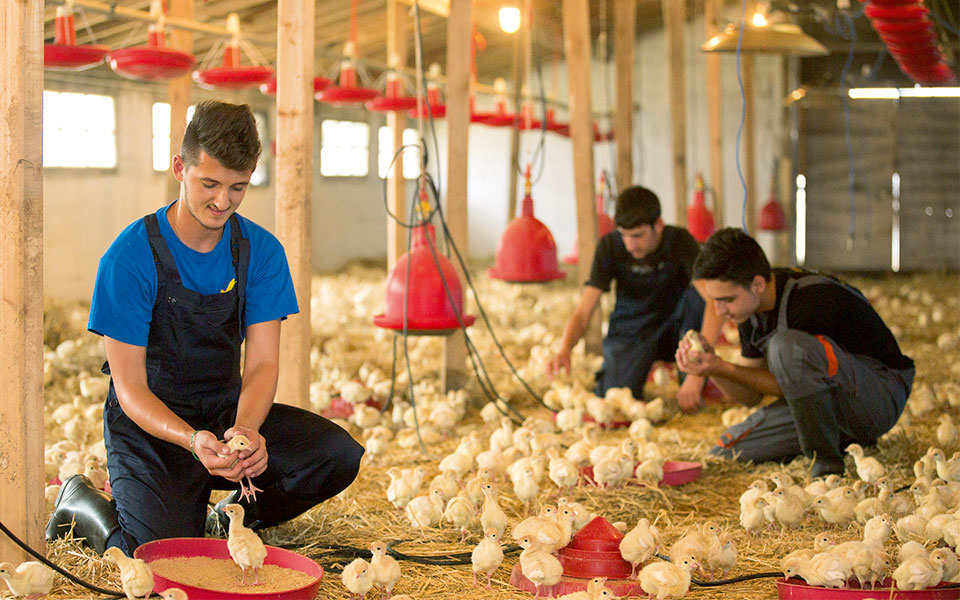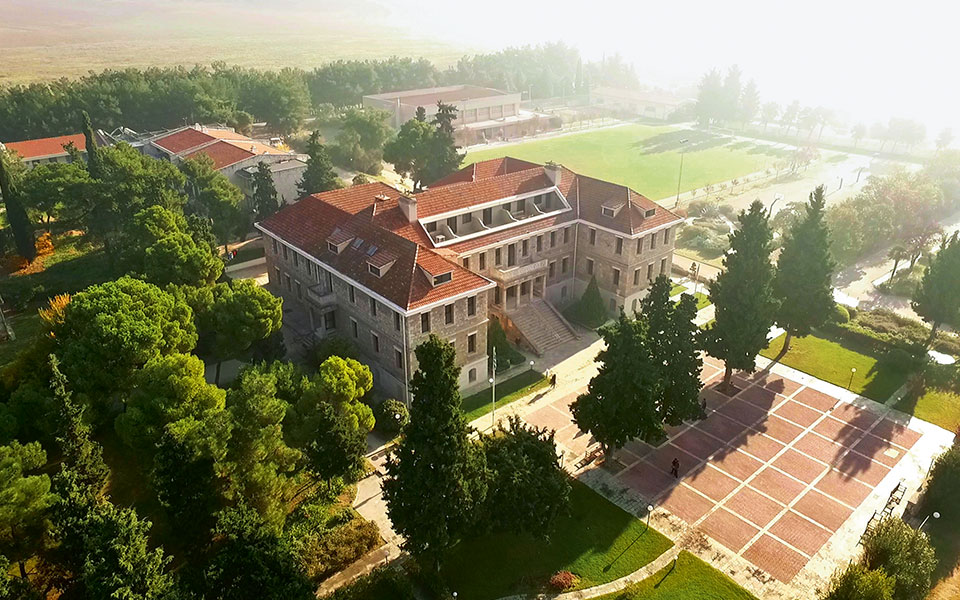Before I was welcomed into the director’s residence on the sprawling grounds of the American Farm School (AFS) in Thessaloniki, northern Greece, I was given an extensive tour of the campus: the daycare center; the kindergarten; elementary school; the general high school and training college, Perrotis College, which offers graduate and postgraduate studies; the areas where the school rears turkeys and cultivates snails; and the students’ vegetable garden. I was awestruck by the overall sense of tidiness, the wonderful buildings and gardens, the high level of organization.
Like most people living in Athens, I knew AFS as the source of fresh milk, traditional yogurt, Omega-3 eggs, cheese, traditional hylopites pasta, trahanas cracked wheat and premium turkey, but I had no idea just how wonderful a place it is, located just a few kilometers from Thessaloniki’s airport.
AFS grew out of the efforts of an American missionary and his wife to teach orphaned boys how to farm and rear animals in the city when it was still a part of the Ottoman Empire, in 1904. Today it is a pioneer in agricultural education, and soon, with the addition of a middle school, it will be in a position to offer every level of education.
Drenched from a rainstorm but excited, I met director Panos Kanellis at the entrance to his home. With the rangy grace of a former athlete, he escorted me into his hospitable living room, where brunch was laid out on the table. As is customary on such occasions, we began our conversation with his own story – an impressive tale of a self-made man – and his connection to AFS.

© Maria-Ioanna Xristoforidou, AFS Αrchive
Dr Kanellis was born in Thessaloniki in 1947 to parents who had fled from Asia Minor, and grew up hearing stories of the old homeland. “What I remember hearing all the time was that I needed to work hard to become successful, that there is no shame in any work,” he recalled.
After studies at Anatolia College and a basketball career with Iraklis, he went to Texas to study chemistry and immediately got a job so he wouldn’t have to rely on his parents’ support. Kanellis spent 13 years in the United States and decided to move back to Greece after the birth of his daughter, starting out in business in Thessaloniki and then taking a job at his alma mater, where he worked from 1997 to 2009, reaching the position of vice president. This was all the experience he needed to head the American Farm School.
“I knew of the school, like all locals, but when I went for the job interview, I didn’t know where the administration building was located,” Kanellis recounted. “As I wandered around, I came across a group of teenagers who had just finished a class and were heading to a practical lesson carrying farm tools. When I asked them whether they liked it here, they said they loved it. They exuded such joy and optimism that I told myself, ‘I’m going to get the job.”

© Illustration by Titina Halmatzi
Proud students
The success of AFS, said Kanellis, lies in the pride of its students to work the land. “Our students have overcome the belief of many Greeks that farming, be it crops or livestock, is a career associated with poverty and hardship,” he said. “Many of the negative reactions when we go to talk about our programs and postgraduate degrees at schools come from the teachers and not the students. So many people still believe that children need to aim for the National Technical University or Law School. They have no vision of what this country needs and have no idea that farming can offer a balanced life and a successful career. That’s one of the reasons why we have a crisis right now. Efforts need to be made to change this mentality.”
When Kanellis took over at the school in late 2009, the Greek media were full of stories about young people returning to their native villages to try to make a living from the land. This trend prompted him to establish a center to help these people get started in the business of agriculture. “We don’t just teach them a thing or two about farming, we teach them all about life in a village,” he said.
His second major initiative was for the school to start offering every level of education, from kindergarten to university. “The idea was that while all of our high school graduates may not end up becoming farmers or getting jobs in the agricultural and food sectors, all of them will know first-hand how to look after the environment, how to live like responsible citizens in harmony with nature, how to respect farmwork and how to recognize good food,” said Kanellis. “This is knowledge that needs to be instilled at a young age and I believe it is an amazing resource for the times ahead. Our students are as familiar with a rake as they are with their cell phones. This makes them happy and balanced people.”
AFS is a not-for-profit organization that is closely tied with the United States in terms of administration and donations, a bond that also permeates its philosophy and cultivates a mentality of excellence. I asked its director whether the success of the school could make residents of Thessaloniki more open to the idea of more private colleges and universities, something many Greeks remain opposed to.

© Maria-Ioanna Xristoforidou, AFS Αrchive
Public education
“The day that Perrotis College is in a position to offer degrees that are recognized by the Greek state, that are equal to those from a state university, we will be inundated with applications,” he said confidently. “There are a lot of professors and students at public universities who are committed to education but the environment does not favor them. This is something that harms all Greeks: that the level of public education could be better. The lack of a plan is not the problem; the lack of political will is. Support is needed from every quarter for the situation to change. Instead, we are witnessing takeovers of universities by groups that are not even enrolled there, attacks, filth and neglect. In the meantime, foreign universities are surging ahead in every area of education as Greece struggles to keep up.”
For Kanellis, the tools AFS provides to its students are instrumental.
“Nothing is possible without knowledge,” he said. “For anyone to be a good farmer today, they need scientific knowledge. Everything has changed since the time that crop farmers drenched everything in pesticide, polluting the water table and unknowingly causing illness. Now everyone needs to adapt to modern practices.”












